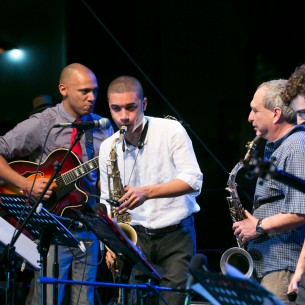Feature photo by Bill Bytsura
The country of Panamá is at the heart of changes that transformed our planet in the most radical ways. Almost five million years ago, seismic changes created the isthmus of Panamá that since then unites the continents of North and South America. Five hundred years ago, Europeans encountered the Pacific Ocean for the first time by travelling the land’s breadth. One hundred years ago, when the Panamá Canal was created as a doorway, the Pacific Ocean and the Atlantic Ocean communicated directly for the first time ever.
The world as we know it would simply not exist without Panamá and the essential interchange of flora, fauna, travel and commerce it has allowed in its history.
Danilo Pérez, acclaimed jazz pianist and composer from Panamá, hopes to once again effect major changes in our world. For the last ten years, he has been on a focused mission to transform the world anew, this time, through the art of music. In Panama City, Pérez shared anecdotes about how his father (a teacher and a singer and bandleader himself) made him aware of the importance of music by using it to teach him school subjects from math to science to electronics. And in particular, he believes that the art of jazz reveals democratic structures which are an ideal antidote to the potentially repressive rigid vertical hierarchies of Latin American societies.
In 2003, Pérez founded the Panamá Jazz Festival. The Festival supports The Danilo Pérez Foundation, which he created to teach jazz to youth in impoverished areas as means of combating the forces of poverty and violence which would otherwise shape their lives. The success of the Foundation’s efforts are seen in the fact that many of it’s students eventually become eligible for scholarships at prestigious music schools in the U.S. such as the Berklee School of Music.

Danilo-Pérez: Photo by Catalina Maria Johnson

Luis Carlos Ayala. student at Danilo Pérez Foundation: Photo by Catalina Maria Johnson
Equally inspiring, the old military bases which until 1991 had housed U.S. soldiers for nine decades, are today transformed into a center for the exchange of knowledge called the “City of Knowledge” or “Ciudad del Saber”. The former barracks echoed laughter and conversation and music during the festival days, as scores of young musicians attended music clinics on subjects from the clave to the conga to jazz improvisation. Also during those days, the Annual Latin American Music Therapy Congress took place, covering topics such as how to use music in treating Alzheimer’s and Autism.
But at the heart of it all, is the abundance of extraordinary music to be experienced. Beyond jazz, the Panamá Jazz Festival also shares the rich tapestry of sounds that emerged in Panama’s history as a crucial crossroads smack in the heart of the Americas. Here’s just a few examples of the kinds of music to be heard:
The Transistmico Project, with Chilean, French and Panamanian musicians, centered on the sounds of maestro Panamanian accordionist Osvaldo Ayala. The project is in the emerging stages and still in the process of finding a voice that complements Ayala’s playing with greater affinity to the folklore of Central America. Here’s a clip describing the project:
A local band, Luci and the Soul Brokers, brought on the funk, and shared a contemporary take on the musical affinity that naturally exists between Panama’s ebullient mestizo identity and other Caribbean rhythms.
One of the highlights of the festival was the Panamá 500 concert, a live performance of Danilo Perez’ upcoming release with the same title. It is a journey through Panama’s history, and includes Yoruban chants (added by maestro afro cuban percussionist and vocalist Román Díaz) as well as indigenous spoken word (indigenous peoples make up about 5% of the population) and European instruments such as the violin.

Panama 500 Concert rehearsal:Photo by Bill Bytsura
It was a masterful set, a heady whirlwind of creole jazz that shimmered, shook and soared as it told the stories of a country that brings two continents and two oceans in constant dialogue.
Along the way, it shared a vision of the possibilities afforded by a different kind of conversation that exists thanks to and through the music, where cultural expressions come together not in conflict and greed and colonialism, but in the sheer joy of a shared humanity and its creative spirit.
